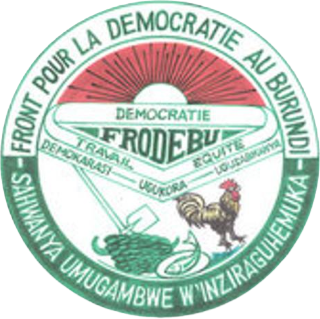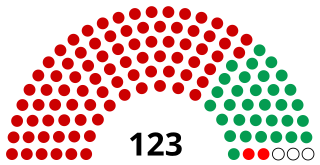Related Research Articles

The Politics of Burundi takes place in a framework of a transitional presidential representative democratic republic, whereby the President of Burundi is both head of state and head of government, and of a multi-party system. Executive power is exercised by the government. Legislative power is vested in both the government and the two chambers of parliament, the Senate and the National Assembly.

The Front for Democracy in Burundi is a political party in Burundi.

Sylvestre Ntibantunganya is a Burundian politician. He was President of the National Assembly of Burundi from 23 December 1993 to 30 September 1994, and President of Burundi from 6 April 1994 to 25 July 1996.

The Burundian Civil War was a civil war in Burundi lasting from 1993 to 2005. The civil war was the result of longstanding ethnic divisions between the Hutu and the Tutsi ethnic groups. The conflict began following the first multi-party elections in the country since its independence from Belgium in 1962, and is seen as formally ending with the swearing-in of President Pierre Nkurunziza in August 2005. Children were widely used by both sides in the war. The estimated death toll stands at 300,000.

The National Council for the Defense of Democracy – Forces for the Defense of Democracy is the major political party in Burundi. During the Burundian Civil War, the CNDD–FDD was the most significant rebel group active and became a major political party in Burundi. The party's rule has been described as authoritarian.

Pierre Nkurunziza was a Burundian politician who served as the ninth president of Burundi for almost 15 years from August 2005 until his death in June 2020.

The National Assembly is the lower chamber of Parliament in Burundi. It consists of 100 directly elected members and between 18 and 23 co-opted members who serve five-year terms.

The Senate is the upper chamber of Parliament in Burundi. It consists of between 39 and 56 members who serve 5-year terms. The current Senate was elected on 20 July 2020 and consists of 39 members. Under the newly promulgated 2018 constitution and following the new administrative division, the senate similarly to the national assembly saw its number of seats reduced. The senate goes from 39 seats to 13 seats starting from the 2025 legislative elections.

The position of vice-president of the Republic of Burundi was created in June 1998, when a transitional constitution went into effect. It replaced the post of Prime Minister.
Immaculée Nahayo Nyandwi was a Burundian politician who was President of the National Assembly of Burundi from 16 August 2005 to 2007, the first woman to hold this position in Burundi. She was also elected as Speaker of the African Parliamentary Union (APU) to March 2007.

The Union for Peace and Democracy–Zigamibanga, sometimes known as the Union for Peace and Development–Zigamibanga, is a small political party in Burundi which was founded in 2002 but which only became active after 2007. The UPD is one of the parties in opposition to the ruling National Council for the Defense of Democracy – Forces for the Defense of Democracy (CNDD–FDD) party. It is seen as the party of Burundi's small Muslim community.
Marina Barampama is a Burundian politician. She was elected Second Vice President on 8 September 2006, replacing Alice Nzomukunda. She remained in post for six months, until she was sacked for her support of Hussein Radjabu. Formerly a member of the National Council for the Defense of Democracy-Forces for the Defense of Democracy (CNDD–FDD), she is now General Secretary of the Union for Peace and Development.
Pascal Nyabenda is a Burundian politician, who serves as President of the National Assembly of Burundi since 2015. He has been president of the ruling National Council for the Defense of Democracy – Forces for the Defense of Democracy since March 2012 and previously served as Governor of Bubanza Province.

The Front for Democracy in Burundi–Nyakuri, also known as Sahwanya Frodebu Iragi rya Ndadaye, is a political party in Burundi.

Parliamentary elections were held in Burundi on 29 June 2015. The vote had been initially set for 5 June 2015, alongside local elections, but it was delayed due to unrest. Indirect elections to the Senate occurred on 24 July.

General Évariste Ndayishimiye is a Burundian politician who has served as the tenth President of Burundi since 18 June 2020. He became involved in the rebel National Council for the Defense of Democracy – Forces for the Defense of Democracy during the Burundian Civil War and rose up the ranks of its militia. At the end of the conflict, he entered the Burundian Army and held a number of political offices under the auspices of President Pierre Nkurunziza. Nkurunziza endorsed Ndayishimiye as his successor ahead of the 2020 elections which he won with a large majority.
Jean‐Marie Ngendahayo is a Burundian politician.
The 2010 Senate of Burundi sat from 2010 to 2015.
The 2020 Senate of Burundi was indirectly elected in 2020 for a five-year term.
Vénérand Kazohera is a Burundian businessman. He was a prominent supporter of the ruling CNDD-FDD party under president Pierre Nkurunziza (2005–2020), and remained active under president Evariste Ndayishimiye.
References
- ↑ "La situation du Burundi "reste précaire", selon Kofi Annan", Panapress (Jeuneafrique.com), 4 November 2006 (in French).
- 1 2 "Burundi VP steps down over graft", BBC News, 5 September 2006.
- 1 2 "Burundi: Le CNDD-FDD entame le processus de chasser Alice Nzomukunda du bureau de l'Assemblée Nationale.", Burundi Réalités, Bujumbura (allAfrica.com), 10 February 2008.
- 1 2 "Burundi’s main opposition party suspends participation in parliament", Panapress (Afrik.com), February 22, 2008.